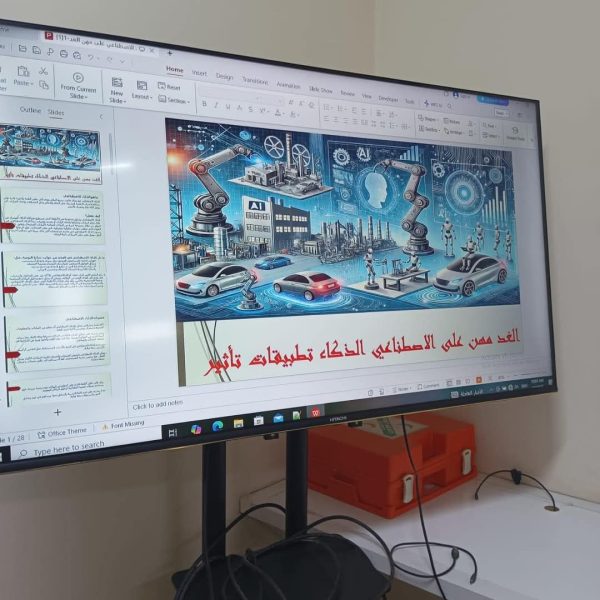Under the patronage of the Dean of the College of Science for Women , Professor Dr. Sameera Naji Khdim, the Continuing Education Unit in cooperation with the Department of Computer Science held a workshop entitled (The Impact of Artificial Intelligence Applications on Tomorrow’s Professions) on Sunday, March 9th. The workshop was held in the department hall and presented by Dr. Ammar Hussein Jassim, Head of the Ibn Sina Unit for E-Learning, Engineer Enas Ahmed, and Assistant Lecturer Hiba Imad. It was attended by a number of department instructors.
First, artificial intelligence was defined as a rapidly developing scientific field that aims to develop systems and devices capable of simulating human mental abilities, such as learning, thinking, solving problems, and making decisions, i.e. making the machine think and act like humans. It includes a group of systems that can simulate human intelligence by learning and analyzing data and making decisions or making recommendations. Artificial intelligence begins to learn from a large set of available data (big data), and this is applied to tasks that require analytical and cognitive skills. In some areas, such as healthcare, AI contributes to providing more accurate diagnoses, while in other areas, such as transportation, it works to develop self-driving cars and AI enters many aspects of our daily lives, such as: smartphones such as voice assistants such as Siri and Google Assistant, social media such as recommendation algorithms and content filtering, self-driving cars that can drive without human intervention, and e-commerce such as product recommendations and personalization of offers. Despite the great progress achieved by artificial intelligence, it raises some concerns and challenges, as it may lead to the loss of many jobs, and the collection and analysis of personal data can pose a threat to privacy and security, and the decisions of systems powered by artificial intelligence may be affected by biases in the data used to train them, so it must be treated with caution and appropriate strategies adopted to avoid risks. The most prominent of these jobs are: Customer service: Robots and virtual assistants can handle simple customer inquiries and solve common problems, reducing the need for customer service employees. Production: Robots are able to perform manufacturing and assembly tasks with high accuracy and speed, which threatens the jobs of workers in factories. Drivers: As self-driving cars develop, jobs like truck and taxi drivers could disappear in the future. Input and analysis: AI can analyze data and information more quickly and accurately than humans, reducing the need for input and analysis staff. Finance: AI can perform many financial tasks, such as stock trading and portfolio management. Journalism: AI can produce simple news reports based on available data, threatening the jobs of journalists who cover current events.











